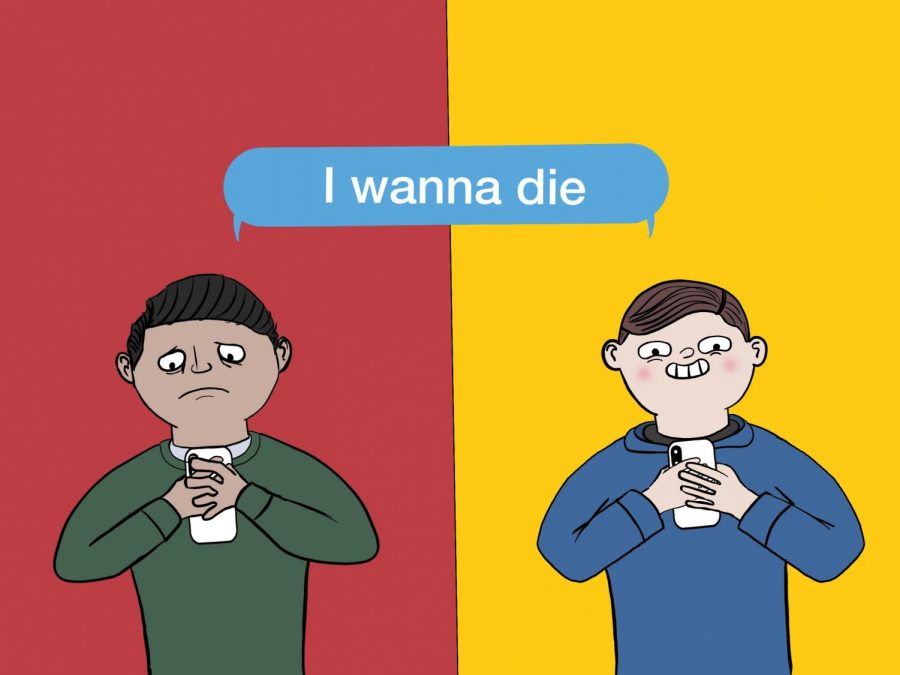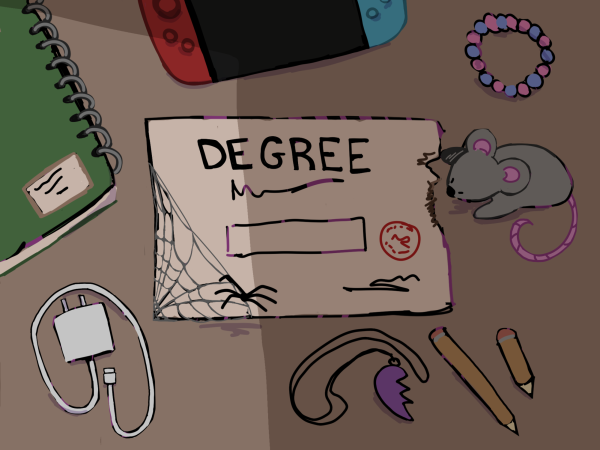Teen language and humor disguises warning signs
During a time of high stress and anxiety, teenagers often turn to humor to express themselves.
Consequently, this often leads to over dramatic ex- pressions that undermine and normalize the severity of serioustopics such as suicide and rape.
Recently, I had a friend say that he wanted to kill himself because he made a careless error on a math problem. The minute he said that, I couldn’thelp but feel that what he saidwas disturbingly insensitive.
Now don’t get me wrong, I’m not a 90-year-old woman shaking her st at kids to get off her lawn. Nor am I that teacher who yells at you about your phone rotting your brain.
I understand that it’s part of our generation’s culture to usehyperboles to easily express emotions.
But there’s a difference be- tween being dramatic and being insensitive. Telling someone that wet hair makes me want to vomit so much that we’d all drown in my puke is dramatic.
Saying you want to kill your- self because you forgot there was a quiz in class or telling people that you got “raped” because you missed getting an A by one percent is insensitive.
The truth is what might be an easy joke for you, could be a se- rious problem for someone else.
Last summer, I was sitting in an empty airport in Japan, waiting for my ight to Shanghai,
when I received a text from a friend. She sounded unusually dejected. My friend, who was only 19, said she was going to kill herself. She immediately stopped replying.
Despite being able to text because of wi , I didn’t have the ability to call anyone. So I tex- ted her boyfriend. I DMed her neighbor on Instagram. I talked to two of my other friends to try and nd her parents’ numbers online. I asked another friend to keep calling her.
I was so far away.
But my ight began to board.I spent the next three hours withmy right leg bouncing up anddown. When I landed I wouldnd out that my friend was safeand with her parents.
But for those three hoursI had no idea if my friend, someone who I love deeply,was alive or dead.
When I came back to school, phony threats of suicide was like a game of “Find the Hidden
Cat.” When you’re looking for the cat, it’s impossible to nd. But once someone points it out, you can’t stop seeing it.
Everywhere I went, every person I talked to, thought that any small mistake or bad moment warranted a call for suicide, which is treated moreas a punchline rather than a serious issue.
According to the Centers for Disease Control and Prevention,suicide is the third leading cause of death for people between theages of 10 and 24.
Scientists examined 693 child suicide deaths in a 2016 study called “Suicide in Ele- mentary School-Aged Children and Early Adolescents.” They found that nearly one-third of the victims had discussed sui-cide with another person.
But today with suicide jokes becoming increasingly normal- ized, real cries for help become lost as background noise. It’s impossible to tell whether a
student is truly suffering, or if they had just nished writing a three-page essay that they choseto procrastinate on.
Along with suicide jokes comes a wide array of care- less cracks regarding sexualviolence and its effect. Peopleunconsciously use sensitivelanguage that can have a painfulimpact on someone else.
My teacher loved to say that we got “triggered” whenever anyone mentioned Donald Trump. My classmates con- stantly bring up having PTSD from Honors Physics.
But when I think of someone being triggered, I don’t think of a teenager being mildly upset about Trump. I see my best friend, a survivor of rape, triggered by a sense of smell.
What starts off as silent painand numbly picking at her nail polish, turns into long, painful sobs, eyes veiled with fear, and short, rapid breathing. Despite sitting right next to her, she’s far
away, stuck in an inescapable ashback.
She suffers from real PTSD.
According to the Rape,Abuse & Incest National Network, 15percent of all sexual assaultvictims in America are between the ages 12-17, with 94 percent of all victims reporting to have developed PTSD in the follow- ing two weeks of their assault.
When we make these jokes, we make light of others’ prob- lems and make it harder for oth- ers to be taken seriously when admitting their own struggles.
Some may say I’m toosensitive. But I’d rather be toosensitive than not enough. And to be frank, instead of blaming others for being too sensitive, work on getting a better sense of humor.
There’s already so much pain intheworld,andalotofitis internalized. I don’t see why we should mindlessly contribute to it when there’s a small, easy wayto help reduce it.



